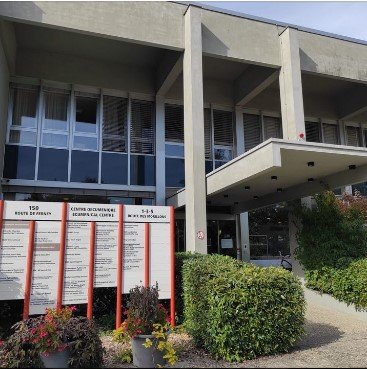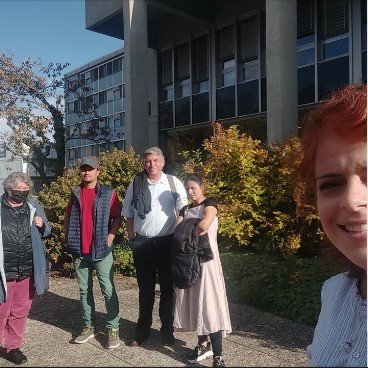EN FR ES
MAY 15TH 2025, INTERNATIONAL CONSCIENTIOUS OBJECTION DAY
MAY 15TH 2025, INTERNATIONAL CONSCIENTIOUS OBJECTION DAY − Social media initiative
May 15th is International Day of Conscientious Objection to Military Service. Several organizations worldwide are planning initiatives to support this human right and to stand in solidarity with those who refuse to kill and engage in wars and are for this reason persecuted, criminalized and jailed.
The undersigned organizations −active also at the European level− address a specific appeal to the European institutions and Member States to protect and fully implement the right to conscientious objection to military service which is inherent in art. 18 of the Human Rights Declaration and art. 18 of the International Covenant on Civil and Political Rights (ICCPR) on the right to freedom of thought, conscience and religion.
This right is stated also in several other international and regional human rights charters.
At the European level we recall, for instance:
Art. 9 of the European Convention on Human Rights and Fundamental Freedoms;
Art. 10 of the European Union Charter;
Recommendation No. R (87) 8 of the Committee of Ministers of the Council of Europe; [1]
Recommendation 1518 of the Parliamentary Assembly of the Council of Europe; [2]
De Gucht Resolution of the European Parliament;
Rulings of the European Court of Human Rights that the right to conscientious objection to military service is protected under article 9 of the ECHR. [4]
We call on Europe to fully implement this human right and to protect those who object to military service in their own countries and that, because of persecutions, seek protection in European countries.
On 16 February 2023, in the resolution ‘One year of Russia’s invasion and war of aggression against Ukraine’, the EU Parliament demanded that Member States provide protection for conscientious objectors and deserters fleeing Belarus, Russia and occupied Ukraine. [5] However, this is not guaranteed in most Member States.
Europe has experienced the atrocities of war and should take a clear stand to protect those who object to war and effortlessly work for peace, to stop any war.
We recall as well the ongoing #ObjectWarCampaign calling for the protection of all those who refuse to engage in the war − particularly in Russia, Belarus and Ukraine and the global initiative #RefuseWar to stand for peace and refuse war everywhere.
On the occasion of this year's May 15th International Day, we are launching a social media initiative focused on Europe to inform and raise awareness on the right to conscientious objection to military service.
We prepared posts and graphic materials with testimonies of conscientious objectors to military service from several countries such as Israel, Russia, Türkiye. The social media kit available here. We invite individuals and groups to join in and stand up for the right to refuse to kill!
Connection e.V. - connection-ev.org
European Bureau for Conscientious Objection - ebco-beoc.org
Pax Christi International - paxchristi.net
Quaker Council for European Affairs - qcea.org
Un ponte per - unponteper.org
War Resisters International - wri-irg.org
Joint by:
International Fellowship of Reconciliation – ifor.org
Mouvement international de la Réconciliation - France - mirfrance.org/MIR
ONAD - South Sudan - onadev.org
Internationaler Versöhnungsbund e.V. - FOR Germany - versoehnungsbund.de
[1] Council of Europe, Committee of Ministers, Recommendation No. R(87)8, 9 April 1987, para. 8. https://www.refworld.org/legal/resolution/coeministers/1987/en/88968
[2] Council of Europe, Parliamentary Assembly, Recommendation 1518 (2001), para. 5.1. https://assembly.coe.int/nw/xml/XRef/Xref-XML2HTML-EN.asp?fileid=16909&lang=en
[3] European Parliament, Resolution on respect for human rights in the European Community (annual report of the European Parliament), (Α3-0025/93), 11 March 1993, as it has been published in the Official Journal of the European Communities C 115, on 26 of April 1993, para. 49 (p. 183).
[4] European Court of Human Rights Grand Chamber Bayatyan v Armenia, application no. 23459/03 (20 July 2011).
[5] https://www.europarl.europa.eu/doceo/document/TA-9-2023-0056_EN.html
15 MAI 2025, JOURNÉE INTERNATIONALE DE L'OBJECTION DE CONSCIENCE
Le 15 mai est la Journée internationale de l'objection de conscience au service militaire. Plusieurs organisations dans le monde prévoient des initiatives pour soutenir ce droit de l'homme et pour se solidariser avec ceux qui refusent de tuer et de s'engager dans des guerres et qui sont pour cette raison persécutés, criminalisés et emprisonnés.
Les organisations soussignées - actives également au niveau européen - adressent un appel spécifique aux institutions européennes et aux États membres pour qu'ils protègent et mettent pleinement en œuvre le droit à l'objection de conscience au service militaire qui est inhérent à l'article 18 de la Déclaration des droits de l'homme et l'art. 18 du Pacte international relatif aux droits civils et politiques (PIDCP) sur le droit à la liberté de pensée, de conscience et de religion. Ce droit est également énoncé dans plusieurs autres chartes internationales et régionales des droits de l'homme. Au niveau européen, nous rappelons, en particulier, ce qui suit :
l'art. 9 de la Convention européenne des droits de l'homme et des libertés fondamentales ;
l'art. 10 de la Charte de l'Union européenne ;
la Recommandation n° R (87) 8 du Comité des Ministres du Conseil de l'Europe [1] ;
la Recommandation 1518 de l'Assemblée parlementaire du Conseil de l'Europe [2] ;
la Résolution De Gucht du Parlement européen [3] ;
les décisions de la Cour européenne des droits de l'homme selon lesquelles le droit à l'objection de conscience au service militaire est protégé par l'article 9 de la Convention européenne des droits de l'homme [4].
Nous appelons l'Europe à mettre pleinement en œuvre ce droit de l'homme et à protéger ceux qui s'opposent au service militaire dans leur propre pays et qui, en raison de persécutions, cherchent une protection dans les pays européens.
Le 16 février 2023, dans la résolution « Un an après l'invasion russe et la guerre d'agression contre l'Ukraine », le Parlement européen a demandé aux États membres d'assurer la protection des objecteurs de conscience et des déserteurs fuyant la Biélorussie, la Russie et l'Ukraine occupée.5 Toutefois, cette protection n'est pas garantie dans la plupart des États membres.
L'Europe a connu les atrocités de la guerre et devrait prendre une position claire pour protéger ceux qui s'opposent à la guerre et travaillent sans effort pour la paix, pour arrêter toute guerre.
Nous rappelons également la campagne en cours #ObjectWarCampaign appelant à la protection de tous ceux qui refusent de s'engager dans la guerre - en particulier en Russie, en Biélorussie et en Ukraine et l'initiative mondiale #RefuseWar pour défendre la paix et refuser la guerre partout.
À l'occasion de la Journée internationale du 15 mai de cette année, nous lançons une initiative sur les médias sociaux centrée sur l'Europe pour informer et sensibiliser au droit à l'objection de conscience au service militaire.
Nous avons préparé des posts et du matériel graphique avec des témoignages d'objecteurs de conscience au service militaire de plusieurs pays tels qu'Israël, la Russie, la Turquie... [kit de médias sociaux disponible ici].
Nous invitons les individus et les groupes à se joindre à nous et à défendre le droit de refuser de tuer !
Connection e.V. - connection-ev.org
Bureau européen pour l'objection de conscience - www.ebco-beoc.org
Pax Christi International - www.paxchristi.net
Quaker Council for European Affairs - www.qcea.org
Un ponte per - www.unponteper.org
War Resisters International - www.wri-irg.org
Rejoints par :
International Fellowship of Reconciliation - www.ifor.org
Mouvement International de la Réconciliation - France - www.mirfrance.org/MIR
ONAD - Soudan du Sud - www.onadev.org
Internationaler Versöhnungsbund e.V. - FOR Allemagne - www.versoehnungsbund.de
[1] Council of Europe, Committee of Ministers, Recommendation No. R(87)8, 9 April 1987, para. 8. https://www.refworld.org/legal/resolution/coeministers/1987/en/88968
[2] Council of Europe, Parliamentary Assembly, Recommendation 1518 (2001), para. 5.1. https://assembly.coe.int/nw/xml/XRef/Xref-XML2HTML-EN.asp?fileid=16909&lang=en
[3] European Parliament, Resolution on respect for human rights in the European Community (annual report of the European Parliament), (Α3-0025/93), 11 March 1993, as it has been published in the Official Journal of the European Communities C 115, on 26 of April 1993, para. 49 (p. 183).
[4] European Court of Human Rights Grand Chamber Bayatyan v Armenia, application no. 23459/03 (20 July 2011). 5https://www.europarl.europa.eu/doceo/document/TA-9-2023-0056_EN.html
15 DE MAYO DE 2025, DÍA INTERNACIONAL DE LA OBJECIÓN DE CONCIENCIA
El 15 de mayo es el Día Internacional de la Objeción de Conciencia al Servicio Militar. Varias organizaciones de todo el mundo están planeando iniciativas para apoyar este derecho humano y solidarizarse con quienes se niegan a matar y a participar en las guerras y que son por ello perseguidos, criminalizados y encarcelados.
Las organizaciones abajo firmantes -activas también a nivel europeo- dirigen un llamamiento específico a las instituciones europeas y a los Estados miembros para que protejan y apliquen plenamente el derecho a la objeción de conciencia al servicio militar que es inherente al art. 18 de la Declaración de Derechos Humanos y en el art. 18 del Pacto Internacional de Derechos Civiles y Políticos (PIDCP) sobre el derecho a la libertad de pensamiento, conciencia y religión.
Este derecho se recoge también en otras cartas internacionales y regionales de derechos humanos. En el ámbito europeo recordamos, por ejemplo
Art. 9 del Convenio Europeo para la Protección de los Derechos Humanos y de las Libertades Fundamentales;
Art. 10 de la Carta de la Unión Europea;
Recomendación nº R (87) 8 del Comité de Ministros del Consejo de Europa [1];
Recomendación 1518 de la Asamblea Parlamentaria del Consejo de Europa [2];
Resolución De Gucht del Parlamento Europeo [3];
Sentencias del Tribunal Europeo de Derechos Humanos según las cuales el derecho a la objeción de conciencia al servicio militar está protegido por el artículo 9 del CEDH [4].
Pedimos a Europa que aplique plenamente este derecho humano y que proteja a quienes objetan al servicio militar en sus propios países y que, debido a las persecuciones, buscan protección en países europeos.
El 16 de febrero de 2023, en la resolución «Un año de la invasión rusa y de la guerra de agresión contra Ucrania», el Parlamento de la UE exigió que los Estados miembros ofrecieran protección a los objetores de conciencia y desertores que huyen de Bielorrusia, Rusia y la Ucrania ocupada.5 Sin embargo, esto no está garantizado en la mayoría de los Estados miembros.
Europa ha experimentado las atrocidades de la guerra y debería adoptar una postura clara para proteger a quienes se oponen a la guerra y trabajan sin esfuerzo por la paz, para detener cualquier guerra.
Recordamos también la actual campaña #ObjectWarCampaign que pide la protección de todos aquellos que se niegan a participar en la guerra, especialmente en Rusia, Bielorrusia y Ucrania, y la iniciativa mundial #RefuseWar para defender la paz y rechazar la guerra en todas partes.
Con motivo del Día Internacional del 15 de Mayo de este año, lanzamos una iniciativa en las redes sociales centrada en Europa para informar y sensibilizar sobre el derecho a la objeción de conciencia al servicio militar. Hemos preparado posts y material gráfico con testimonios de objetores de conciencia al servicio militar de varios países como Israel, Rusia, Türkiye. . .[kit de medios sociales disponible aquí]. Invitamos a individuos y grupos a unirse y ¡defender el derecho a negarse a matar! 14 de mayo de 2025
Connection e.V. - connection-ev.org
European Bureau for Conscientious Objection - www.ebco-beoc.org
Pax Christi Internacional - www.paxchristi.net
Quaker Council for European Affairs - www.qcea.org
Un ponte per - www.unponteper.org
War Resisters International - www.wri-irg.org
junto con:
Movimiento Internacional de Reconciliación - www.ifor.org
Mouvement International de la Réconciliation - Francia - www.mirfrance.org/MIR
ONAD - Sudán del Sur - www.onadev.org
Internationaler Versöhnungsbund e.V. - FOR Alemania - www.versoehnungsbund.de
[1] Council of Europe, Committee of Ministers, Recommendation No. R(87)8, 9 April 1987, para. 8. https://www.refworld.org/legal/resolution/coeministers/1987/en/88968
[2] Council of Europe, Parliamentary Assembly, Recommendation 1518 (2001), para. 5.1. https://assembly.coe.int/nw/xml/XRef/Xref-XML2HTML-EN.asp?fileid=16909&lang=en
[3] European Parliament, Resolution on respect for human rights in the European Community (annual report of the European Parliament), (Α3-0025/93), 11 March 1993, as it has been published in the Official Journal of the European Communities C 115, on 26 of April 1993, para. 49 (p. 183).
[4] European Court of Human Rights Grand Chamber Bayatyan v Armenia, application no. 23459/03 (20 July 2011). 5https://www.europarl.europa.eu/doceo/document/TA-9-2023-0056_EN.html




















































































